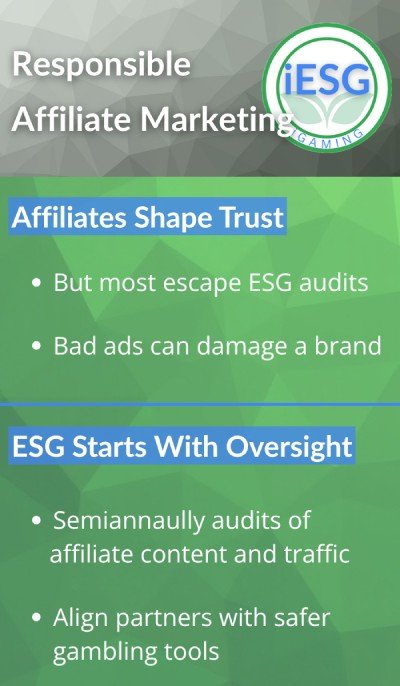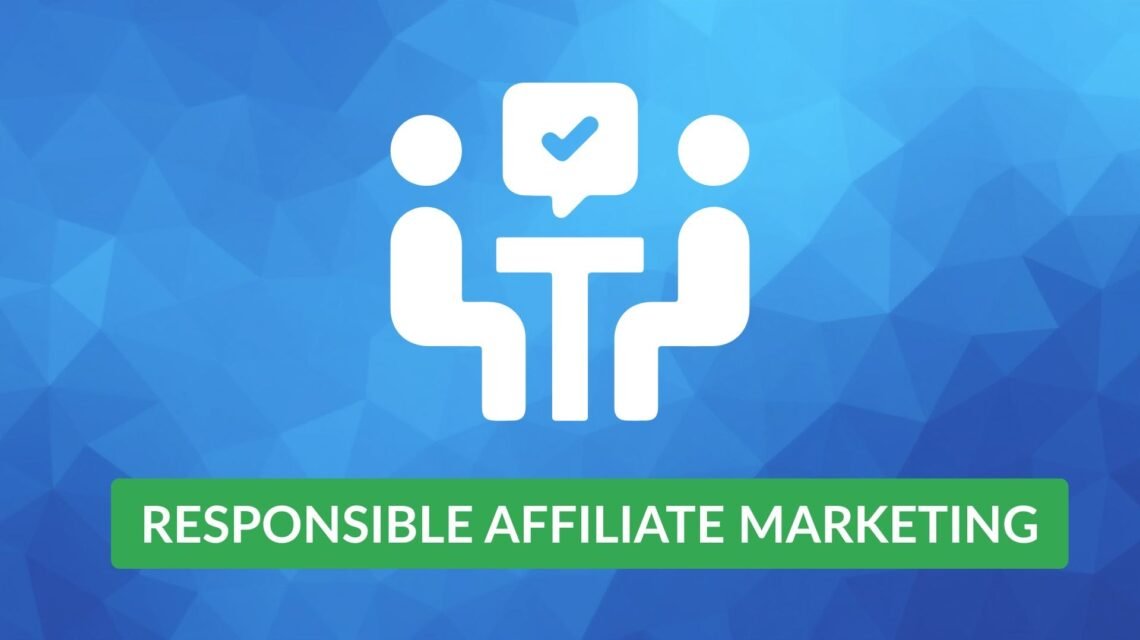When iGaming companies talk about ESG, the spotlight usually lands on operators and game providers. But what about the third pillar of the ecosystem … affiliate marketing? Despite driving massive volumes of traffic, conversions, and revenue, affiliate networks often escape scrutiny in social, and governance strategies. It’s time to fix that. Responsible affiliate marketing is no longer a nice-to-have, it’s a core component of risk management, brand integrity, and sustainable growth.
Affiliate networks fuel iGaming’s growth, yet for most of them, ESG strategies aren’t yet a priority. That silence creates risk. A risk that cannot be ignored anymore in 2026.
Affiliates don’t just market brands, they shape player journeys, influence trust, and expose operators to reputational fallout. It’s time the industry brings them into the ESG spotlight.
Responsible Affiliate Marketing and Hidden ESG Risks
Despite their vital role, affiliates are rarely included in ESG disclosures or audits. That’s becoming more of a problem.
Operators massively depend on affiliate partners to drive traffic, yet many lack transparency into how, where, and to whom their brand is being promoted. This can create a reputational minefield. Especially when promotions are misleading, unlicensed, or target vulnerable players.
Without proper vetting, operators may unintentionally fund black-hat marketing ads, such as fake countdowns, no bonus terms, or claims like “win guaranteed.” These aren’t just questionable practices, they may violate local regulations and cause repercussions. Worse, such irresponsible affiliate tactics might target self-excluded players, undermining any safer gambling commitments.
Then there’s ad fraud: fake traffic, bots, cloaking, and undisclosed influencer partnerships are alarmingly common nowadays. All of these fall under poor governance, and yet they often operate in plain sight.
Responsible affiliate marketing isn’t just about avoiding fines and reputational damage. It’s about aligning with stakeholder expectations, safeguarding player trust, and maintaining long-term license viability.

Auditing Responsible Affiliate Marketing Through an ESG Lens
Affiliates shouldn’t be excluded from governance frameworks. Instead, they should be audited just like any other vendor.
A responsible affiliate audit includes:
- Content Review: Do promotions include transparent T&Cs, fair bonus explanations, and responsible gambling messaging?
- Traffic Analysis: Are leads generated from real users or suspicious patterns (e.g. high bounce rates, bot traffic)?
- Compliance Monitoring: Is the affiliate active in regulated markets—and if so, are they licensed where necessary?
- RG Alignment: Does the partner offer links to exclusion programs, spending limit tools, or safer gambling resources?
- Brand Usage: Are logos, screenshots, or bonuses presented accurately, or is there any manipulation?
Tools like GiG Comply or Rightlander can help automate large-scale affiliate reviews. But real ESG integration goes beyond automation; it means applying human oversight and holding affiliates to measurable standards.
An operator committed to responsible affiliate marketing should go beyond simple performance metrics. They should include relevant ESG benchmarks in contracts, demand visibility into sub-affiliates, and create a path for affiliates to improve or exit the program if misaligned.
💡 Escalation risk in responsible affiliate marketing in iGaming is pattern-driven, not incident-driven. Repeated affiliate compliance failures and manipulative UX signals accumulate into ESG risk, which the iESG Assessment is built to surface early.
From Blind Spot to ESG Priority: Responsible Affiliate Marketing
The consequences of ignoring affiliate ESG risks are beginning to mount. Regulators are beginning to scrutinize affiliate relationships more closely, and players are savvier about spotting manipulation.
The UK Gambling Commission, for example, holds operators accountable for affiliate misconduct, whether or not they directly controlled the campaign¹. In Sweden, misleading affiliate ads can even jeopardize license renewals.2
Beyond compliance, there’s growing investor pressure to report holistically on ESG efforts, including external partners like affiliates. If an operator’s brand appears next to exploitative or misleading content, the reputational damage can undo years of trust-building.
In short: Responsible affiliate marketing is the next ESG frontier. Ignoring it won’t just hurt reputation … it could cost market access.
🏅 The iESG membership provides operators with a sector-specific reference point for how responsible affiliate marketing and safer gambling governance are expected to be structured and evidenced.
How Responsible Affiliate Marketing Looks Like
Operators serious about ESG should develop a Responsible Affiliate Framework that includes:
- Onboarding Standards: Vet affiliates on content quality, RG alignment, and jurisdictional compliance.
- Ongoing Monitoring: Use tools and manual review to assess promotions monthly or quarterly.
- RG Integration: Require affiliate sites to link to exclusion tools and display safer gambling messaging.
- Sub-Affiliate Controls: Avoid unchecked networks—insist on transparency throughout the chain.
- Exit Mechanism: Create clear offboarding processes for affiliates who violate the framework.
The good news: for affiliates, this isn’t a burden, it’s a business opportunity! Those who can demonstrate alignment with ESG principles are more likely to attract high-value partnerships and long-term deals.
Conclusion: Affiliates Can’t Be ESG Ghosts
The iGaming industry has made major strides in ESG, but affiliate marketing remains somewhat of a blind spot. Now is the time to bring it into the light.
Responsible affiliate marketing isn’t about adding red tape. It’s about protecting players, aligning with regulations, and proving that ethical growth is possible, even in the most performance-driven corner of the business.
Operators that take the lead now will not only reduce ESG risk, but stand out in a crowded, scrutinized market. Because the future of affiliate marketing isn’t just about conversions—it’s about credibility.
FAQ – Responsible Affiliate Marketing in iGaming
What is responsible affiliate marketing in iGaming?
Responsible affiliate marketing refers to affiliate campaigns that align with ethical, transparent, and ESG-compliant standards, especially around safer gambling and truthful promotions.
Why is responsible affiliate marketing important for ESG in iGaming?
Because affiliate practices directly impact player trust, regulatory risk, and a brand’s ESG credibility.
How can operators ensure responsible affiliate marketing?
By auditing affiliate content regularly, enforcing RG standards, and using compliance tools like Rightlander or GiG Comply.
Are affiliate networks part of ESG reporting in iGaming?
They should be. Responsible affiliate marketing is increasingly seen as part of good governance and risk management.
What risks come from irresponsible affiliate marketing?
These include reputational damage, regulatory penalties, and player harm, especially from misleading or non-compliant ad practices.
How does responsible affiliate marketing support safer gambling?
It ensures that promotional content doesn’t exploit vulnerable players or bypass exclusion tools.
Can affiliate programs be held liable for ESG breaches?
In some jurisdictions, yes, especially when affiliate practices violate advertising or responsible gambling regulations.
Sources:
- UK Gambling Commission: “New guidance on the role of marketing affiliates”
https://www.gamblingcommission.gov.uk/news/article/new-guidance-on-the-role-of-marketing-affiliates
2. Spelinspektionen
https://www.spelinspektionen.se/

